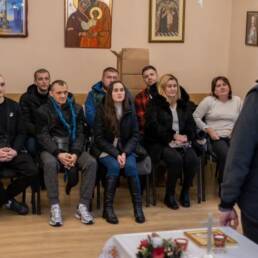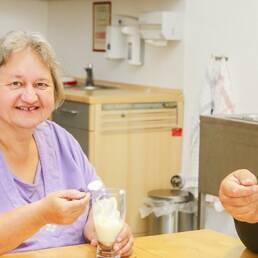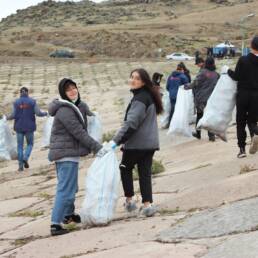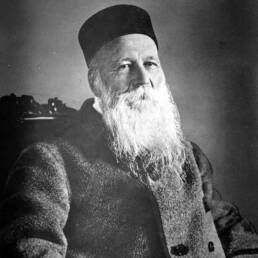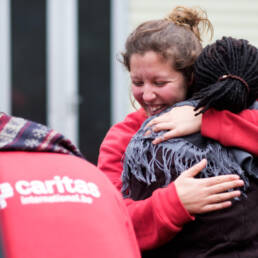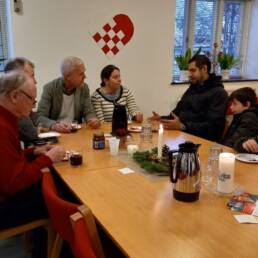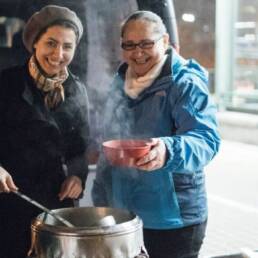Author
Gareth Rowe
CAFOD-Durham Research Fellow
Caritas England and Wales (CAFOD)
We have the tools – let’s use them
St. Paul tells us that all things work together for good for those who love God – but sometimes it’s hard to believe him. The news relentlessly speaks of wars and rumours of wars, nation rising against nation, famines and earthquakes in various places and perhaps we ask ourselves whether this is the end?
For the past year or more I have been working on a project with CAFOD’s Theology Team. We have spoken to a wide range of CAFOD1/Caritas partners across the Global South. Hearing first-hand how people are struggling because of an unjust economic system exacerbated by climate, Covid and conflict has been difficult. The project began before the Russian invasion of the Ukraine, so we have been able to see that the current inflation and energy crisis, which to many of us in the Global North seems like a new situation, is a deepening and a worsening of structural problems which have existed for decades.
So what should we do? There is an emerging literature in pastoral theology which looks at how people respond to climate trauma and the polarisation of wealth in the neo-liberal age (E.g. La Mothe 2019, McCarroll 2022, Pihkala 2022). Basically, there is the kind of anxiety that paralyses and the kind that spurs us to action. Often, the things we are able to do seem so small, so insignificant, in the face of the global challenges. Where Jesus speaks of wars and rumours of wars, famines and earthquakes in Matthew 24, he describes these traumas not as the end, but rather as “the beginning of birth pains” (Mat.24:8). Where then should we look for signs of new life?
Firstly, as Pope John XXIII suggested, we need to open the windows of the church and look out. How can we, as Christians, contribute to what is already going on? The 17 Sustainable Development Goals give a framework for global co-operation and action. Secondly, sustainability and ESG (environmental, social and governance) standards give a way to incorporate these into the thinking and actions of private, public and third sector entities. Thirdly, the ‘alphabet-soup’ of reporting standards has been brought together in the International Sustainability Standards Board. This should not be underestimated: the ISSB has moved as far in two years as purely financial reporting moved in the last two hundred. Clear, consistent, regulated reporting of sustainability should remove opportunities for greenwashing and give us accurate data about who is part of the problem and who is part of the solution.
Closer to home, the church now has a century of Catholic social teaching to draw upon. Perhaps one way of looking at this afresh is to draw an analogy with secular developments. Perhaps the papal magisterium is a little like the SDGs: big, strategic direction pointers but a little short on operational detail. Conversely, a review of bishops’ conference documents from across the world has shown that over time these have become increasingly helpful at incarnating CST in a local context. The overall movement in these papers since the 1970s has been from generalised teaching documents to calls for action on specific issues (McGoldrick 1998, 2014). Moreover, the conversations we had as part of the project in countries like Kenya have shown us examples of active and vibrant Caritas organisations who are really putting the insights of CST into place on a local level. Perhaps these are a little like the ESG layer of our secular analogy: a sort of median level, operationalising CST in many places across the globe.
And this brings me to the next steps. Climate trauma/eco anxiety/neo-liberal anxiety – or however the issues of today’s world are described– will increasingly affect people everywhere. There is no longer any ‘us’ and ‘them’ – we saw that with the pandemic: your problem is my problem. Pope Francis often refers to ‘popular movements’ which he sees as having the ‘culture’, ‘method’ and ‘wisdom’ the world needs (Letter 12 April 2020). Perhaps he is suggesting that your solution is my solution and I wonder whether this focus on ’popular movements’ – the grassroots – will be the cornerstone of Francis’s legacy. Here we see an invitation for people everywhere.
Which brings me to my last point of analogy with the secular world. How do we hold ourselves to account? How do we hold CST to account? Practically, we need to show that the insights of CST are effective – otherwise what is their value? Theologically, our accountability to God is mediated this side of the eschaton by our accountability to people and planet and the qualitative and quantitative methods we can devise – in good faith – to further the common good.
When Jesus fed the five thousand, he did not create the bread and fish out of nothing. Rather he used what the disciples already had. In CST and in secular frameworks we have many of the tools we need to address the critical issues of our time. We now need to use them prayerfully, consistently and effectively – and monitor and report on their effectiveness, holding ourselves accountable to God via the mediators of people and planet. If we do this in faith, perhaps the Lord will multiply our efforts some thirty, sixty or a hundred times.
1.CAFOD is the international Caritas organisation of England and Wales.


